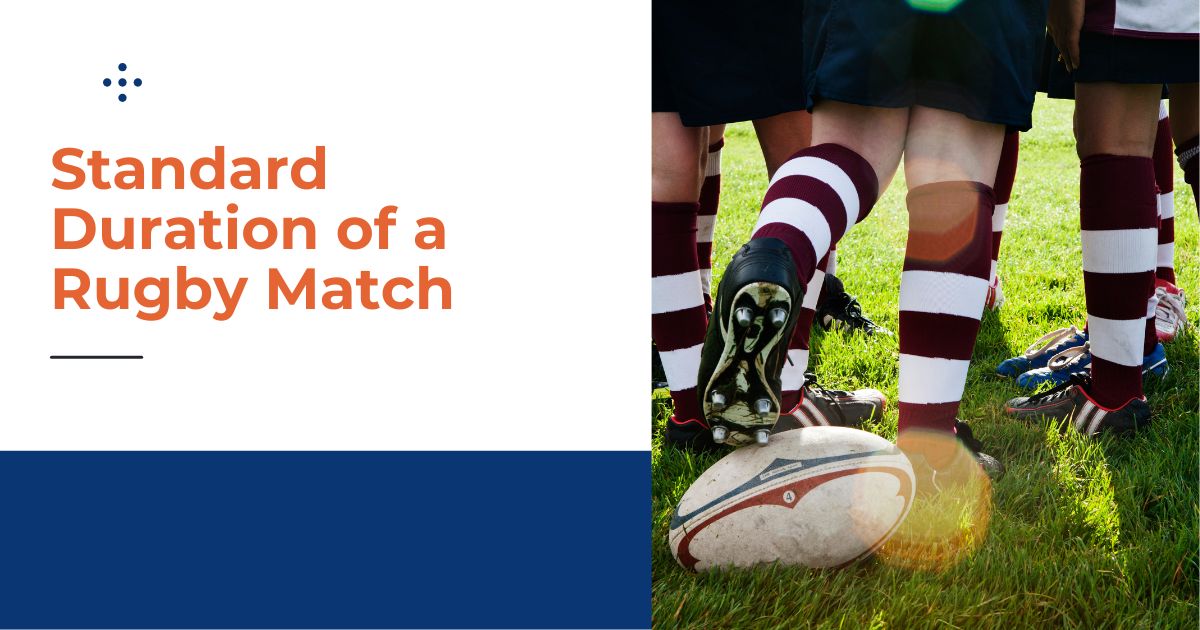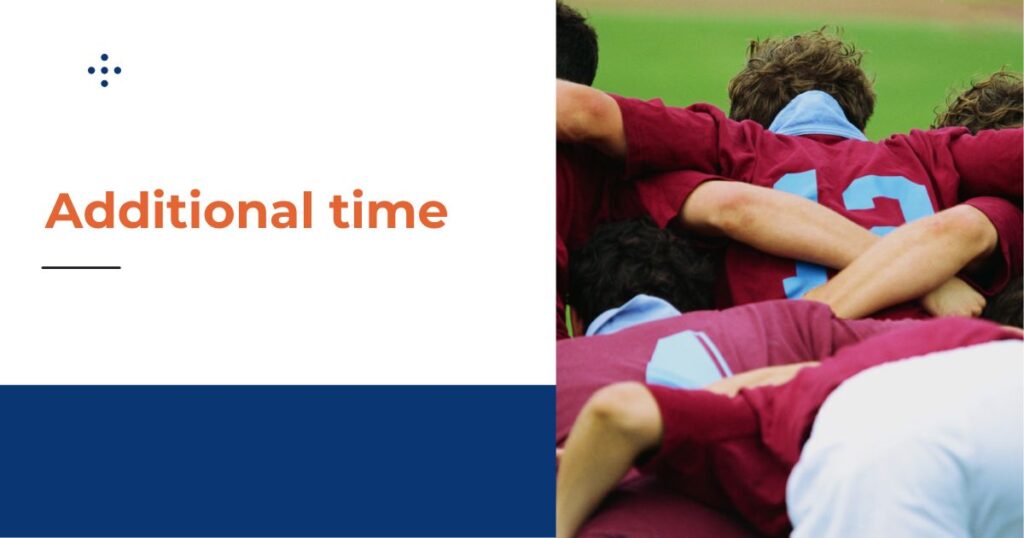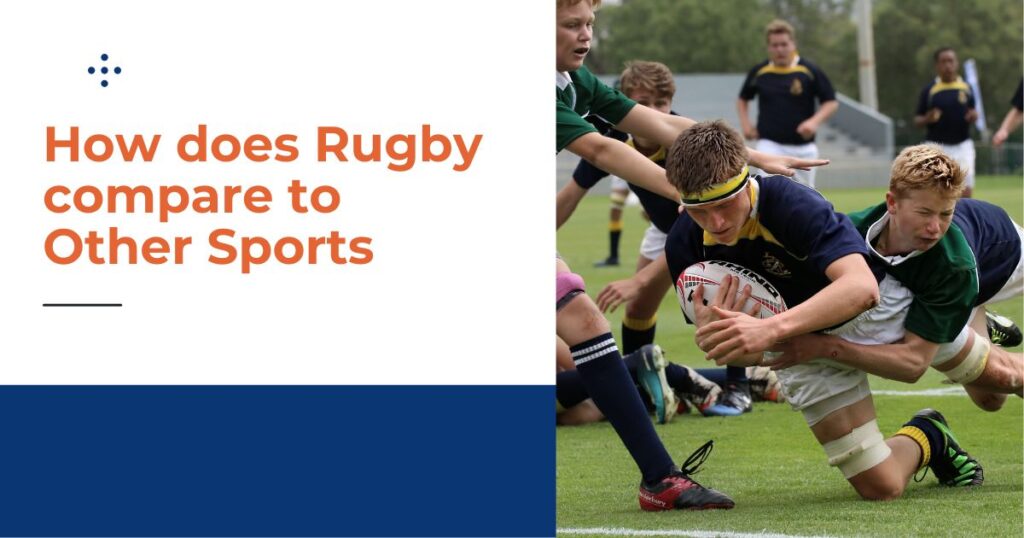What Is The Average Duration Of a Rugby Match? Insights Into The Durations of Rugby Matches

Snack Mid-Morning
Overview
Rugby is a thrilling and physically demanding sport enjoyed by millions worldwide. Whether you’re a seasoned fan or new to the game, one of the most common questions is: How long is a rugby match?
The answer isn’t as straightforward as you might think, as the duration can vary depending on the type of rugby being played.
In this blog, we’ll break down everything you need to know about the length of a rugby match, including stoppage time, overtime, and variations across different formats.

The most common form of rugby, Rugby Union, follows a standard match duration:
– Two halves of 40 minutes each, totaling 80 minutes of playing time.
– A halftime break of 10-15 minutes separates the two halves.
However, the actual time a rugby match takes can be longer than 80 minutes due to stoppages for injuries, substitutions, and other delays. Unlike some sports, the clock in rugby is stopped during these interruptions, ensuring the full 80 minutes are played.
Why is the Clock Stopped in Rugby?
In rugby, the referee has the authority to stop the clock for various reasons, such as:–
- Injuries: If a player is injured and requires medical attention, the clock is paused.
- Substitutions: Time is added when players are substituted.
- Video Reviews: In professional matches, the referee may consult the TMO (Television Match Official) to review decisions, which can take several minutes.
- Scrum Resets: The clock is stopped if a scrum collapses and needs reset.
This ensures that the full 80 minutes are dedicated to actual gameplay, making rugby matches more intense and action-packed.
Differences on the Duration of the Rugby Matches

Not all rugby matches fall within the same timeframe. Here’s a look at some of the formats and their variations in duration:
Rugby League
– Rugby League is similar to Rugby Union in that it features two 40-minute halves for a total of 80 minutes.
– The normal halftime period is approximately 10 minutes.
– Matches in Rugby League are generally known to be played at a faster pace with fewer stoppages than is experienced in Rugby Union, thus it is common for games to be completed in closer proximity to 80 minutes.
Rugby Sevens
– Matches of Rugby Sevens are much shorter in duration, however the tempo is much higher than that of normal rugby.
– In every game, there are two 7-minute halves, which adds up to 14 minutes of game time.
– The standard halftime break is 2 minutes for Sevens, enhancing the pace, variety, and enjoyment of the Sevens format.
– Since many games are often played in a single day, stretchers needed for the longer Sevens matches are not as common, resulting in a need for shorter halved formats.
Youth and Amateur Rugby
– For younger players or less developed leagues, the length of matches is often shortened to allow for adequate safety and fitness levels.
– As an example:
– Under-12 matches have: 20-minute halves (adding up to a total duration of 40 minutes).
– Under-16 have: 30-minute halves (60 minutes of total time).
– Adult amateur matches: These may adhere to the 40-minute halves, but can differ based on league guidelines.
Additional time

The time when a match is delayed is referred to as stoppage time, or more commonly ‘injury time’ or ‘added time’. Time added accounts for:
– Attending to injuries: Severe injuries which require medical attention can cause considerable delays to the match as they may add several minutes to the match.
– Substitutional changes: Each substitution can take a few seconds and when multiplied over the course of a game can extend gameplay greatly.
– Video Review: During the match, the TMO (Television Match Official) can review tries, foul plays, and other incidents, taking several minutes, which results in added time.
– Scrum Resets: The scrum clock stops when a scrum collapses and has to be reset, which means until the scrum is finished, the clock does not run.
Even if the match runs over for some reason, stoppage time guarantees that the 80 minutes of gameplay is fully utilized.
Overtime and Tie Breakers

A rugby match might sometimes run longer than the normal duration for some reasons:
– Knockout Tournaments: In contests needing a definitive winner, tied matches can enter overtime, this is usually made up of two halves of ten minutes.
– Sudden Death: Some tournaments declare a team winning with the “sudden death” rule if scores are still tied after overtime, meaning the first team scoring wins.
– Penalty Shootouts: In some extreme cases, penalty kicks are the deciders of who wins the match. Both teams alternately shoot towards the goal and the team with the most successful hits wins.
How does Rugby compare to Other Sports?

If you follow other sports, you may question how rugby time compares to other match durations:
– Soccer: 90 minutes of playtime with two 45 minute halves, plus some stoppage time.
– American Football: 60 minutes of gameplay, which are fractioned into four fifteen minute quarters, but the match isa usually over 3.5 hours due to constant stoppages.
– Basketball: In the NBA, there is 48 minutes of real gameplay (split into four 12 minute quarters!), however, in real time it may stretch longer because of timeouts and fouls.
With this mix of hard-fought action over time combined with the staggered pacing of the whistle blows, watching or playing rugby is equally exciting.
Conclusion
In what ways does the format influence the duration of a rugby match? The format influences duration in the following ways:
– Rugby Union and Rugby league: 80 minutes of gameplay, with additional time for stoppages and a half time break.
– Sevens Rugby: 14 minutes of gameplay with a short halftime period.
– Youth and Amateur rugby: Play time is adjusted based on age and skill level of the players.
Whatever the format is, rugby is a tense and exciting sport that keeps the viewers very engaged regardless of the match length. Next time you catch the match you will comprehend better the factors that affect its duration.
Frequently Asked Questions
An 80-minute standard rugby match lasts roughly 1.5 to 2 hours total including clock stops and halftime.
The time it takes for injuries to be treated, substitutions to be made, and a plethora of other issues all add to the total time of the match, even if all these issues tend to halt the clock during that time.
Labeled “Rugby Sevens,” these matches are the shortest, clocking in at a blistering 14 minutes of true active gameplay.
Halftime in rugby in 10-15 minutes for rugby union and rugby league, while in rugby sevens it is an abysmally short 2 minutes halftime.
Labeled “Rugby Sevens,” these matches are the shortest, clocking in at a blistering 14 minutes of true active gameplay.
In certain competitions, particularly during group stages, a match can end in a draw if the scores remain tied after eighty minutes.
The longest rugby match on record lasted over 100 minutes as it was a knockout tournament with extended stoppage time and multiple overtime periods.
Rugby Sevens features very few players on the field, 7 instead of the usually expected 15, resulting in faster-paced and high-scoring matches. This, alongside the short duration of the matches, aids in multiple matches being played in a single day, which is great for tournaments.



